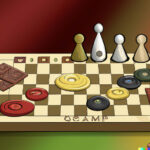Classical board games have a timeless appeal that continues to captivate players of all ages. These games offer a unique blend of social interaction and strategic thinking, making them a perfect choice for gatherings with friends or family. In this article, we will explore the best classical board games specifically designed for three players, highlighting their engaging gameplay and enjoyable mechanics.
One of the reasons why classical board games remain popular is their ability to bring people together. They create opportunities for face-to-face interactions, fostering communication, laughter, and friendly competition. Whether it’s sitting around a table rolling dice or placing tiles on a game board, these games provide a shared experience that creates lasting memories.
Additionally, classical board games challenge players to think critically and strategically. From carefully managing resources in Settlers of Catan to forming complex words in Scrabble, these games require players to make decisions that have both immediate and long-term consequences. They provide an intellectual workout while still offering a fun and entertaining experience.
In the next sections of this article, we will delve into the criteria for choosing the best classical board games for three players. We will examine factors such as game mechanics and player engagement, as well as the delicate balance between luck and strategy in each game. So gather your friends or family members because it’s time to explore the world of classical board games for three players.
Criteria for choosing the best classical board games for 3 players
When looking for the best classical board games for 3 players, there are certain criteria to consider. These criteria ensure that the game mechanics and player engagement are well-balanced, creating an enjoyable experience for all participants. One important aspect to consider is the balance between luck and strategy in each game. A good board game should offer a fair mix of both elements, allowing players to employ various strategies while also incorporating an element of chance.
Additionally, it’s important to look for games that have strong player interaction. The social aspect of playing board games is often what makes them so appealing. Games that encourage negotiation and communication between players can enhance the overall experience and create memorable moments during gameplay.
When assessing potential board games for 3 players, it’s crucial to consider the game mechanics as well. The rules should be easy enough to understand but still offer depth and complexity. This ensures that players can quickly pick up the game and start having fun, while also providing enough strategic options to keep them engaged throughout multiple playthroughs.
In summary, when choosing the best classical board games for 3 players, one should prioritize a good balance between luck and strategy, strong player interaction, and engaging game mechanics. By considering these criteria in the selection process, you can ensure that you find a game that will provide hours of enjoyment and entertainment for your group of three players.
Settlers of Catan
Settlers of Catan is a classic board game that has gained immense popularity since its release in 1995. It is a strategic game designed for 3 to 4 players, making it perfect for smaller groups. The objective of the game is to be the first player to reach 10 victory points by building settlements, cities, and roads on the island of Catan.
The game starts with each player placing two settlements and roads on different intersections of the board. Each intersection represents a resource tile, such as wood, brick, ore, wheat, or sheep. Throughout the game, players take turns rolling dice to determine which resource tiles produce resources. These resources are then used to build settlements and cities or trade with other players.
One aspect that makes Settlers of Catan unique is the element of negotiation and trading among players. Since not all resources are equally available on the board, players need to trade with each other strategically to acquire the necessary resources for their plans. This adds a social and interactive dynamic to the gameplay.
To keep things interesting and unpredictable, there are also special cards called development cards that can be bought with resources. These cards provide various benefits such as gaining extra resources or improving one’s chances in battles for control over certain areas of the board.
Settlers of Catan is a strategic game that requires careful planning and decision-making. Players must consider both short-term goals, such as acquiring necessary resources, as well as long-term objectives like achieving victory points through building settlements and cities. The balance between luck (dice rolls) and strategy adds an exciting element to the gameplay – no two games are exactly alike.
Ticket to Ride
Ticket to Ride is a highly enjoyable and accessible board game that is perfect for 3 players. The game, designed by Alan R. Moon, has gained immense popularity since its release in 2004. It combines elements of strategy, planning, and a touch of luck, making it engaging for players of all ages and experience levels.
Building train routes and completing destination cards
One of the main objectives in Ticket to Ride is to build train routes connecting various cities across the United States or other regions featured in different editions of the game. Players collect colored train cards to claim routes on the board, using them effectively to connect cities and score points.
In addition to building routes, players also have destination cards which provide specific routes that they must complete by the end of the game. These cards can add an extra layer of strategic decision-making as players must choose whether to focus on short routes that can be completed quickly or longer ones that offer more points but may take longer to accomplish.
Enjoyable gameplay and unique scoring system
What makes Ticket to Ride particularly fun is its intuitive gameplay mechanics and unique scoring system. On their turn, players can either draw train cards from the deck or take new route cards from a selection available on the table. This allows for tactical decision-making as players carefully plan their next move based on their current resources and objectives.
Furthermore, Ticket to Ride introduces a clever scoring system where points are awarded for each completed route at the end of the game. However, any incomplete or unfulfilled destination cards at that point result in penalty points deducted from a player’s final score. This feature adds an element of tension as players must weigh risk versus reward when deciding which destination cards to pursue.
Overall, Ticket to Ride delivers an enjoyable gaming experience with its accessible ruleset and engaging gameplay mechanics. Its blend of strategy and luck ensures that every playthrough is different, keeping players coming back for more. Whether you’re a seasoned board gamer or new to the hobby, Ticket to Ride is a fantastic choice for a classical board game that can be enjoyed by 3 players.
Carcassonne
When it comes to classical board games that are perfect for three players, Carcassonne is a standout choice. This tile-placement game combines simplicity and strategy in a way that keeps players engaged and entertained throughout. The objective of Carcassonne is to strategically build cities, roads, and farms by placing tiles on the board in order to earn points.
The rules of Carcassonne are relatively simple, making it accessible to both casual and experienced board gamers. Players take turns drawing and placing tiles, which feature different types of terrains such as cities, roads, fields, and monasteries. Each tile must be placed adjacent to an existing one, with the goal of connecting similar terrains together to create complete features.
One aspect that sets Carcassonne apart from other classical board games is its strategic depth. Building cities can provide large amounts of points, but also carries the risk of not being completed if another player connects their own city or features clash. When playing with three players, competition for control over these features can become intense.
Overall, Carcassonne offers an engaging gaming experience with its combination of tactical decision-making and interpersonal competition. It strikes a balance between luck and strategy that keeps each game excitingly unpredictable. For those who enjoy using their spatial awareness and planning skills while outsmarting opponents, Carcassonne is undoubtedly one of the best classical board games for three players.
Pandemic
Pandemic is a cooperative board game that presents a unique challenge for three players. In this game, players must work together to save humanity from deadly diseases spreading across the globe. Unlike traditional competitive board games, Pandemic fosters collaboration and emphasizes teamwork to achieve a common objective.
The objective of Pandemic is to find cures for four global diseases before they overwhelm the world. Players take on the role of specialized members of a disease control team, each with their own unique abilities. Working together, they must travel around the world, treating and preventing outbreaks in cities, researching cures, and ultimately finding a way to eradicate the diseases.
One of the key aspects of Pandemic is its cooperative nature. Players must openly communicate and strategize with each other to devise the best possible plan of action.
Each player’s role is distinct and vital for the team’s success, whether it be as a medic who can easily treat infections or a scientist who can discover cures more efficiently. It’s crucial for all three players to work together effectively by coordinating their actions and making informed decisions based on each other’s strengths.
What sets Pandemic apart from other board games is its unique mechanics that create suspenseful moments and unexpected challenges. The game introduces an epidemic mechanic where new outbreaks occur unpredictably across the map, intensifying the pressure on players. Additionally, special event cards add strategic elements as players can use them strategically when critical situations arise.
The cooperative element in Pandemic heightens not only the excitement but also encourages strong social interaction among players. Success depends on effective communication and collaborative decision-making skills. With its intense gameplay and challenging objectives, Pandemic provides an exhilarating experience for three players looking for an immersive cooperative adventure while presenting an ever-changing set of obstacles to overcome together.
Dominion
Dominion is a highly popular deck-building game that offers an engaging and strategic experience for three players. In this game, players take on the role of monarchs striving to expand their kingdom and gain valuable victory points. With its unique mechanics and countless card combinations, Dominion provides endless replayability and challenges players to develop effective strategies.
Objective and Mechanics:
The objective of Dominion is to build the most prosperous and efficient kingdom by acquiring valuable cards from various card piles. Each player starts with a small deck of basic cards, which consist of treasure cards used to purchase new cards, action cards that provide additional abilities, and victory point cards that contribute towards the final score.
During each turn, players draw five cards from their personal deck and use them strategically to perform actions, obtain more cards, or acquire victory points. The key mechanic in Dominion is building a customized deck by gradually adding more powerful cards from the available choices or card piles. As the game progresses, players refine their decks to increase efficiency and optimize their chances of winning.
Card Combinations and Strategies:
What sets Dominion apart from other board games is the vast array of possible card combinations. With over 30 different types of kingdom cards available in each game, players can create diverse strategies based on their preferred style of play. Some kingdom cards may provide strong offensive or defensive capabilities, while others enable interaction with opponents’ decks or allow for efficient resource generation.
Successful strategies in Dominion often revolve around finding synergies between different types of cards to maximize their effectiveness. For example, combining action cards that provide extra actions with those that allow for drawing additional cards can lead to powerful turns with multiple combos being executed. Alternatively, focusing on gaining victory point cards in the later stages of the game can secure a significant lead in scoring.
| Card Type | Description |
|---|---|
| Treasure Cards | Used for purchasing more cards |
| Action Cards | Provide additional abilities and actions |
| Victory Point Cards | Contribute towards the final score |
In conclusion, Dominion is a highly strategic deck-building game that offers a unique gaming experience for three players. With its customizable decks, countless card combinations, and diverse strategies, Dominion remains a favorite among board game enthusiasts.
Whether you’re a fan of strategic planning or enjoy discovering new card synergies, this game provides ample opportunities for engaging gameplay and friendly competition. So gather your friends and family to embark on an exciting journey of building prosperous kingdoms in Dominion.
Scrabble
Scrabble is a beloved classic word game that has been entertaining players for decades. It is a perfect choice for three players who enjoy challenging their vocabulary and strategic thinking skills. The objective of the game is to score points by creating words on the game board using letter tiles.
Overview and Objective
In Scrabble, each player starts with a rack of seven letter tiles. On each turn, the player can choose to either form a new word or add letters to an existing one. The words are formed on a 15×15 grid, and players must connect their words to other existing words on the board.
The main objective of Scrabble is to score as many points as possible. Each letter tile has a corresponding point value, and different spaces on the board offer bonus points for certain letters or words. Players strategize by aiming to use high-scoring letters effectively and by taking advantage of these bonus spaces.
Challenge and Strategy
Scrabble poses several challenges to its players. Firstly, players must consistently come up with new words using the limited supply of letter tiles they have. This requires not only strong vocabulary skills but also creativity in finding unique combinations of letters.
Another challenge lies in strategic placement of the words on the board. Experienced players will plan their moves carefully, trying to extend existing words or create opportunities for high-scoring combinations. They might also aim to place their words strategically around bonus squares in order to maximize their points.
Additionally, players must also be mindful of their opponents’ moves. Blocking off key spots on the board or depriving them of desirable letters can give players a significant advantage over their opponents.
Scrabble is not only an enjoyable way to spend time with friends but also a game that sharpens language skills and critical thinking abilities. With its timeless appeal, three players can engage in a friendly competition that tests their word knowledge and strategic acumen.
Chess
Chess is widely regarded as the ultimate classical board game and has been enjoyed by millions of players for centuries. Its enduring popularity can be attributed to its rich history, deep strategy, and the mental challenge it provides. Chess has transcended time and culture, captivating players of all ages and skill levels.
The origins of chess date back to ancient India around the 6th century, and it has since evolved into a worldwide phenomenon. The game’s objective is simple: each player strives to checkmate their opponent’s king by strategically moving their pieces across the board. However, mastering chess requires more than just understanding the basic rules.
What sets chess apart from other board games is its emphasis on strategy and foresight. Each move must be carefully considered, as every decision made can have far-reaching consequences. Players must anticipate their opponent’s moves while planning out their own tactics simultaneously. This aspect of chess makes it an engaging mental exercise that strengthens critical thinking skills and encourages strategic thinking.
Playing chess is not just a solitary activity; it also fosters social interaction and camaraderie between players. Whether played in friendly matches or competitive tournaments, chess brings people together and provides a platform for intellectual engagement. It is not uncommon to witness intense concentration at chess tables, followed by moments of excitement or disappointment as the game unfolds.
| Category | Data |
|---|---|
| Objective | Checkmate the opponent’s king |
| Number of Players | 2 |
| Mechanics | Turn-based, strategic movement of pieces |
| Average Playing Time | 30 minutes to several hours |
| Luck vs Strategy Balance | Purely strategic with no element of luck |
Conclusion
In conclusion, classical board games continue to have an enduring appeal for 3 players due to their timeless nature and the social and strategic aspects they offer. These games provide a tangible and interactive experience that is often missing in today’s digital world. They create opportunities for meaningful interactions, friendly competition, and the chance to exercise strategic thinking.
When it comes to choosing the best classical board games for 3 players, there are several important criteria to consider. Game mechanics that engage all players and strike a balance between luck and strategy are crucial. Games like Settlers of Catan, Ticket to Ride, Carcassonne, Pandemic, Dominion, Scrabble, and Chess successfully meet these criteria by offering unique gameplay experiences tailored for 3 player engagement.
Settlers of Catan stands out as a classic strategic game that fosters player interaction and negotiation. Ticket to Ride offers accessible gameplay with its train route building concept and enjoyable scoring system. Carcassonne provides a simple yet challenging tile-placement experience for building cities, roads, and farms. Pandemic offers a cooperative challenge where players must work together to save humanity from diseases.
Dominion introduces the deck-building concept with various card combinations and strategies to win. Scrabble tests word forming abilities while requiring thoughtful placement on the game board. Lastly, Chess remains the ultimate classical board game that demands deep strategy and skill.
In conclusion, whether it’s gathering around a table with friends or spending quality time with family members, classical board games for 3 players offer an enduring appeal that can bring people together in fun and meaningful ways. So why not gather your loved ones for a game night?
Explore these recommended classics and create lasting memories filled with laughter, camaraderie, and friendly competition. Let these timeless games remind us of the joy derived from unplugged connections in this digital age.

I love playing all kinds of games – from classics like Monopoly to modern favourites like Ticket to Ride.
I created this blog as a way to share my love of board games with others, and provide information on the latest releases and news in the industry.





